We may earn revenue from the products available on this page and participate in affiliate programs. Learn more ›
_
Best Overall
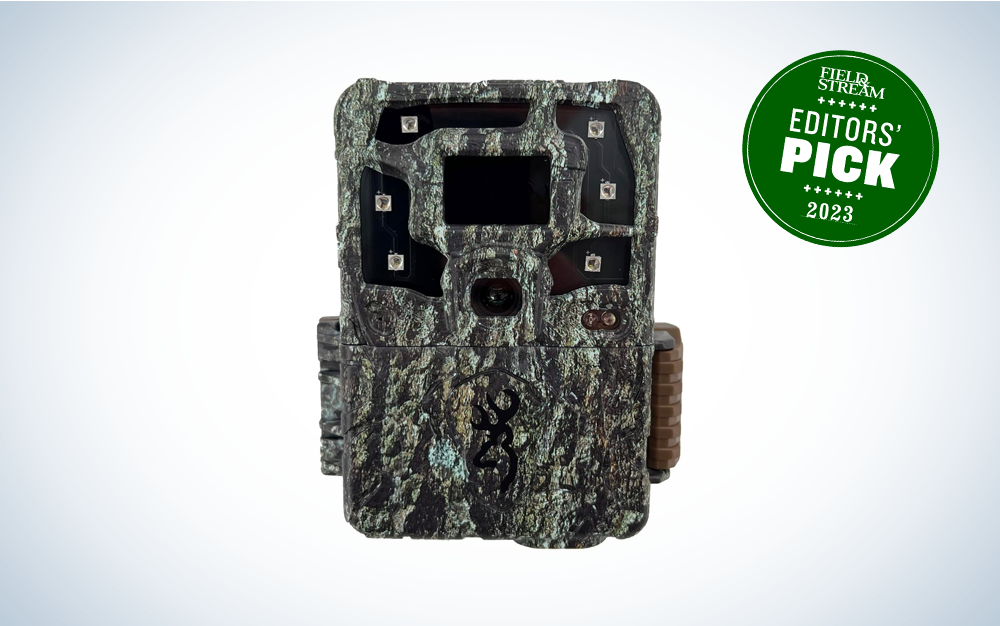
Browning Strike Force Pro X 1080
Summary: The Strike Force’s lightning-fast trigger speed, brilliantly designed mounting bracket, and excellent picture quality all help set it apart from the competition.
Best Value
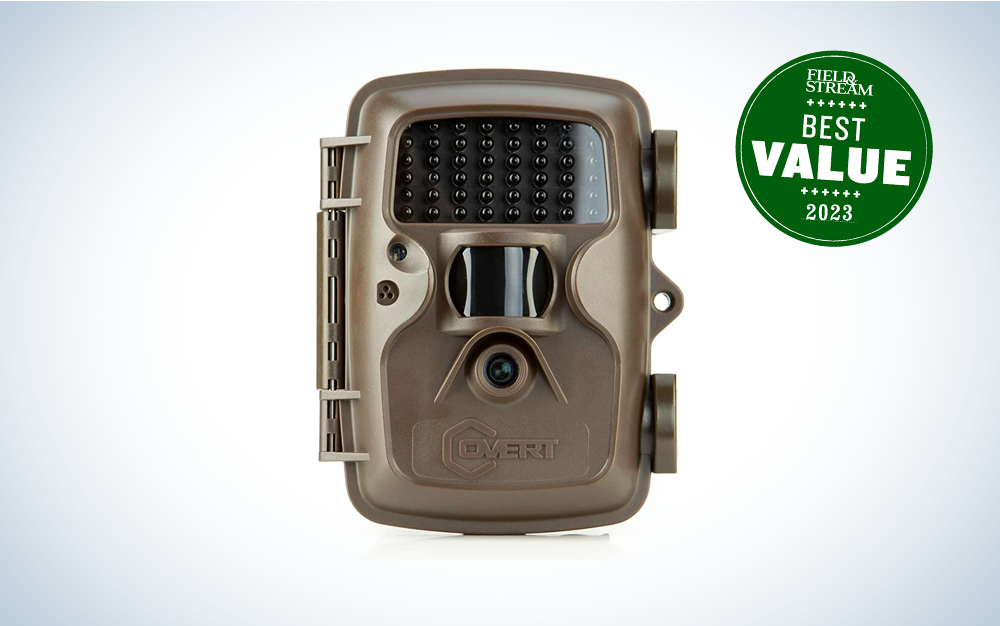
Covert MP30
Summary: The MP30 has a speedy trigger, long detection range, and takes excellent photos for a camera that only costs $80.
Best Picture Quality
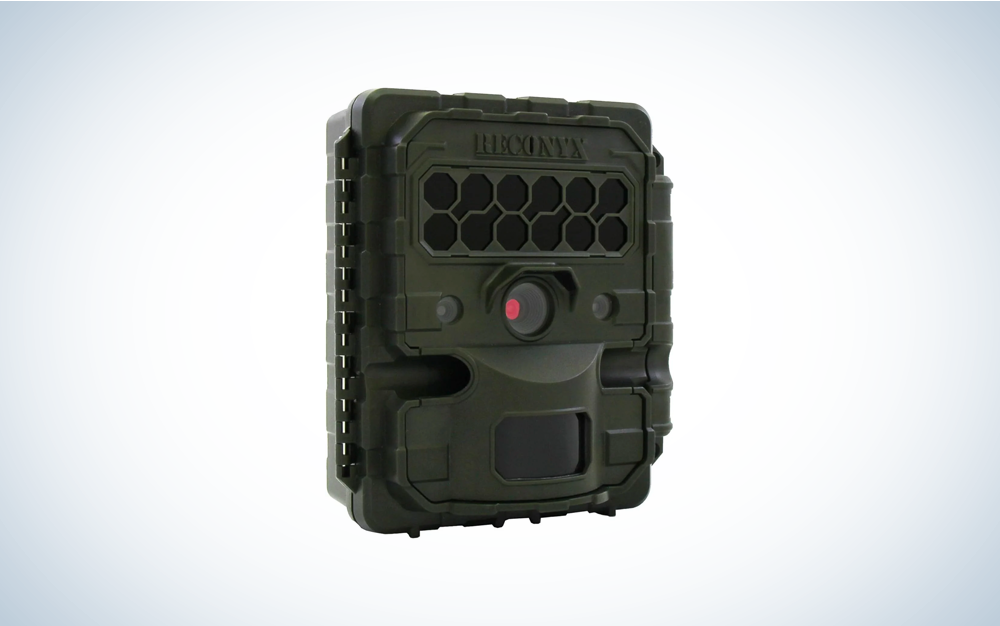
Reconyx Hyperfire
Summary: The Reconyx has an awesome warranty and is a well-built camera that produces incredible, crisp details other cameras can’t match.
First, let me say right off the bat that this is a review of conventional, non-wireless trail cameras. If you’re done with SD cards and weekly visits to camera sites, then check out our recent test of the best cellular trail cams of 2023 here. Second, I have to break a bit of sad news for those of us who still love conventional cams: their heyday is fading fast. Manufacturers are already scaling back of the number of new non-wireless cams so they can focus on the latest wiz-bang cellular models.
But let’s not get ahead of ourselves. Sure, having a cell cam that automatically fires off real-time photos to your phone is incredibly handy. But proper setup can be a pain, and they require good service. If you’ve used cell cams long enough, don’t tell me you haven’t wondered if they’re sending you all the pics they’re actually taking. Cell cams aren’t cheap either. Over time, with service costs, running several wireless cams is way more expensive than using conventional ones. All of which is to say that conventional cams are dead yet—not by a long shot. I love cell cams for scouting bucks in sensitive areas where I don’t want to make regular intrusions, but the majority of my considerable trail-cam arsenal is still comprised of practical, reliable, and affordable non-wireless models. Conventional cams are remain one of the best scouting investments you can make, which is why we test them every year—to help you choose the right ones for your hunting. So, here we go.
Best Trail Cameras of 2023
Best Overall: Browning StrikeForce ProX1080
Best Value: Covert MP30
Best Picture Quality: Reconyx Hyperfire 2
Best Mini Cam: Moultrie Micro-42i
Best Newcomer: Alpha Cam Dual Lens 4K
Rest of the Best Trail Cameras of 2023
How We Tested for the Best Trail Cameras
When my test cameras arrived, I installed batteries, put in an SD card, and set each one up in my yard to evaluate trigger speed, picture and video quality, and detection range by walking in front of them at pre-measured distances, day and night, the looking at the photos. I also deployed cams on several mock scrapes to check their performance on wild deer. The results that follow were derived from the following set of criteria:
Ease of Setup: Compared to their wireless cousins, conventional cams are typically a snap to set up and get running. Still, navigating the menu to program the camera needs to be pretty seamless and easy to understand. I followed the manufacturer’s instructions to get the camera programmed to my preferences. I judged each camera on how easily this process went for me.
Picture Quality: This can be tied into cost (as in, the more you spend, the better the pics), but not always. While I included the company’s megapixel rating in each camera’s description, it’s important to not be misled by this number, as it’s one of the most misunderstood features of trail cams. Manufacturers can exaggerate MP ratings through a process known as interpolation, which digitally adds megapixels to a photo without actually improving the picture. In other words, a 30 MP camera may not have any clearer or better pics than a 3 MP camera. So yeah, the best way to judge the quality of a camera’s pics is to simply look at the images.
Trigger Speed: Basically defined as how long it takes the camera to snap a pic (or start shooting video) from when it detects movement. Generally speaking, the faster the better. One-fourth of a second (0.25) is about as good as it gets, and a half-second is respectable for most camera setups. Anything much slower than that is decidedly ho-hum, and the camera better be darn good at something else to do well in this test.
Detection Range: The maximum distance at which a camera will “sense” an object (hopefully a critter, but weeds and tree branches will do; something to keep in mind when setting cameras up) and trip the tigger. Again, as a rule, the greater the distance the better, as the camera will get more pics of more animals.
The Best Trail Cameras of 2023: Reviews and Recommendations
Best Overall: Browning Strike Force Pro X 1080

Why it made the cut: Like most Brownings cams, this one offers top-of-the line performance at a mid-range price.
Specs
Trigger speed: .2 seconds
Detection range: 90 feet
Power: Six AA batteries
Price: $159.95
Pros
Super-fast trigger
Good pic and video quality
Excellent mounting bracket
Cons
Sticky battery tray
Smaller viewing screen
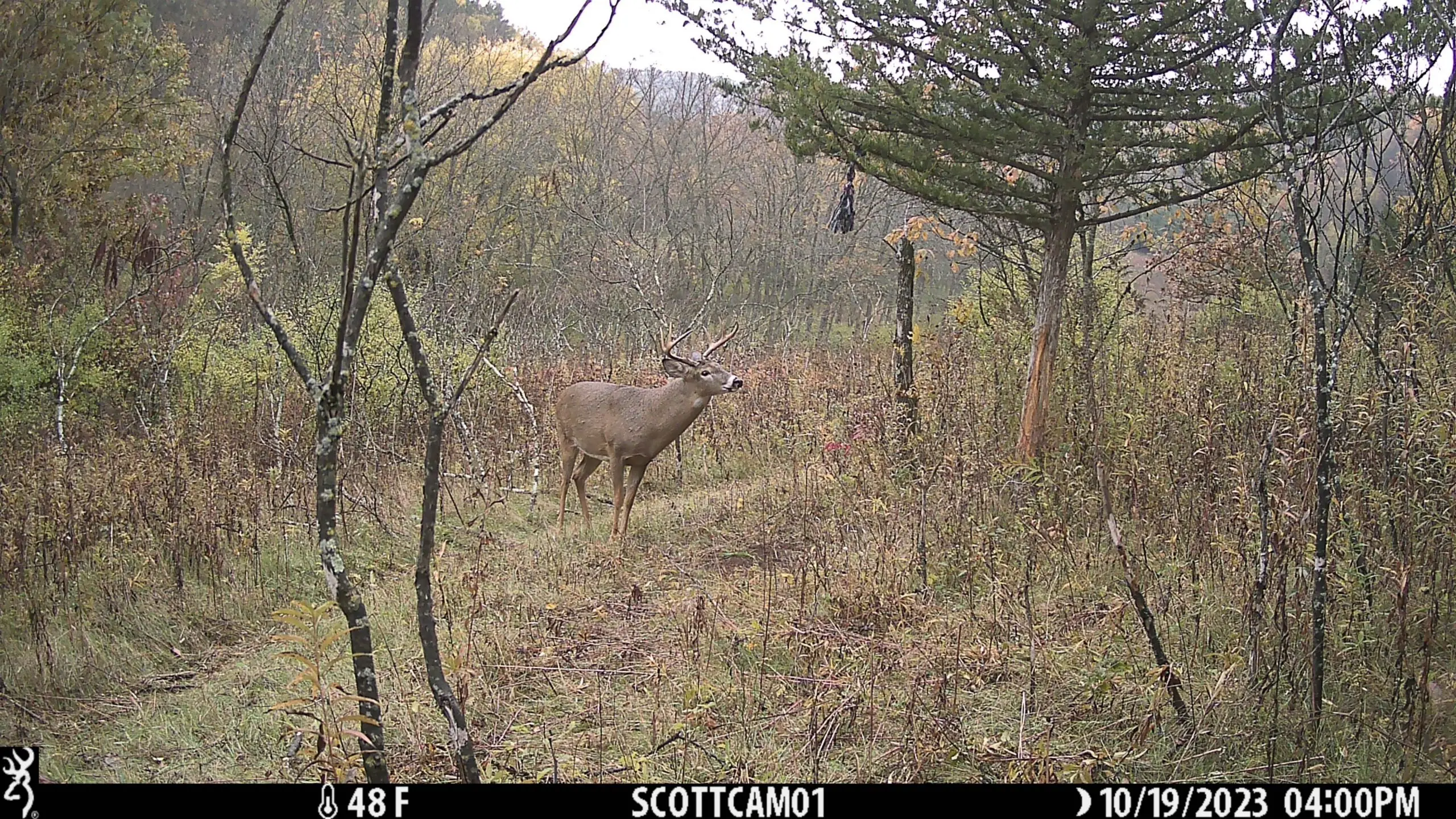
| Scott Bestul |

| A pair of images captured by the author’s test camera shows the photo quality of the Strike Forces ProX 1080. Scott Bestul |
Sometimes it’s the little things that make a big difference, and the Strike Force, like most Browning cameras, has a small feature that is a stroke of genius: a metal mounting bracket that allows the camera to be tipped at an angle. If, like me, you’ve jammed hundred of sticks behind trail cameras to get it to sit right on a tree, you’ll appreciate this feature so much you’ll want to kiss the camera. But that’s far from the reason why this model earned out Editor’s Pick Award. The Strike Force Pro X 1080 simple does everything well. It sports Browning’s typically-zippy trigger and has the best detection range of all the new-for-2023 cameras I tested, which, in combination, means the camera doesn’t miss much of anything. Picture quality is very good and video quality is solid, too. If the battery life on this model is anything like the many Browning’s I’ve tested—and there’s no reason to think it will by any different—the Strike Force is going to be my new go-to conventional camera.
Best Value: Covert MP30

Why it made the cut: Exceptional value for a no-nonsense camera that takes fine pics and video.
Specs
Trigger speed: .25 seconds
Detection range: 80 feet
Power: 8AA batteries
Price: $79.99
Pros
Unbelievable price
Solid speed and detection range
Good daylight pics
Cons
Confusing to program
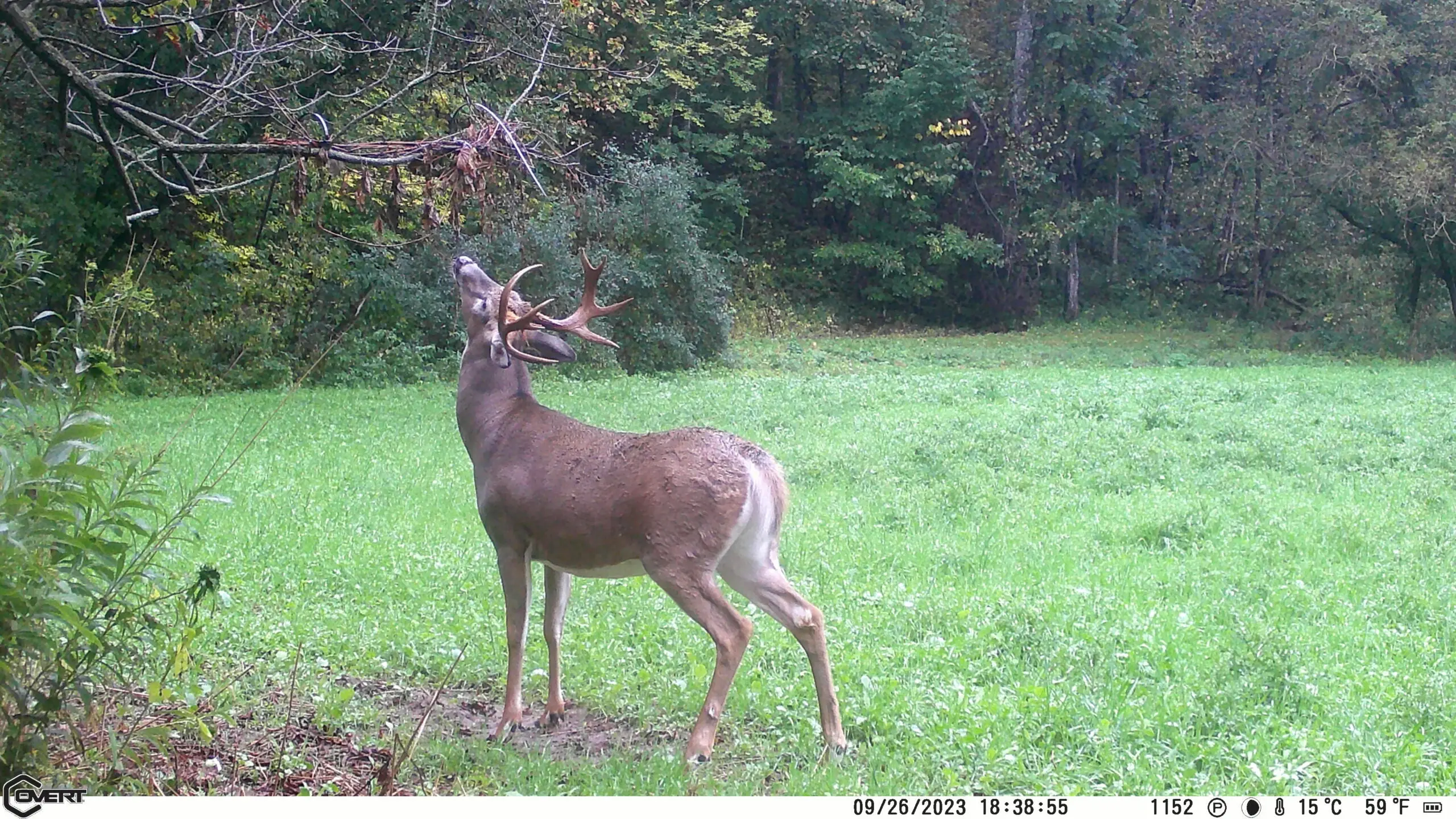
| Another in-field test image revealing solid photo quality, this time from the affordable Covert MP30. Scott Bestul |
I’m a firm believer that the best way to scout the most effectively with trail cams is to have a pile of them out there, working their butts off for you. So it’s a numbers game, and that can get spendy. On the other hand, cheap cameras that don’t work well are more trouble than they are worth. So, you need a camera that walks the budget vs. performance tightrope like a circus star. Covert’s MP30 exactly that kind of camera. In fact, after years of testing cameras of all sorts, I’d say that the MP30 is about as good as a budget camera comes. I had to scratch my head a bit on the setup, but that was a small price to pay for an $80 cam that has a fast trigger, a good detection range, and shoots great pics. For those reasons, it wins our 2023 Best Value Award in a walk.
Best Picture Quality: Reconyx Hyperfire 2

Why it made the cut: Reconyx has pretty much ruled the best-picture category since its inception.
Specs
Trigger speed: .2 seconds
Detection range: 85 feet
Power: 12 AA batteries
Price: $399
Pros
Super-fast trigger
Outstanding picture quality
Good detection range
Solid case construction
Cons
High price point
Lots of batteries!
It’s easy to run out of superlatives when it comes to Reconyx cameras; they just take exceptionally beautiful pictures and miss almost nothing that walks past them. They’re super-easy to program, and the camera case is tough and solid and watertight. Plus, in a world jammed with cheap electronics that fail early and often, the company offers a five-year warranty. Other than the high price and the fact that it runs on 12 batteries, the Hyperfire 2 really has everything you want in a conventional camera, including an easy setup, super-fast trigger, and great detection zone. But what set it apart are the photos. If picture quality is your number-one priority because you want to see every sticker and fork and burr on every rack, then this is the camera to have. If I didn’t have to take out a loan to accomplish it, I’d own a closet full of these babies.
Best Mini Cam: Moultrie Micro-42i
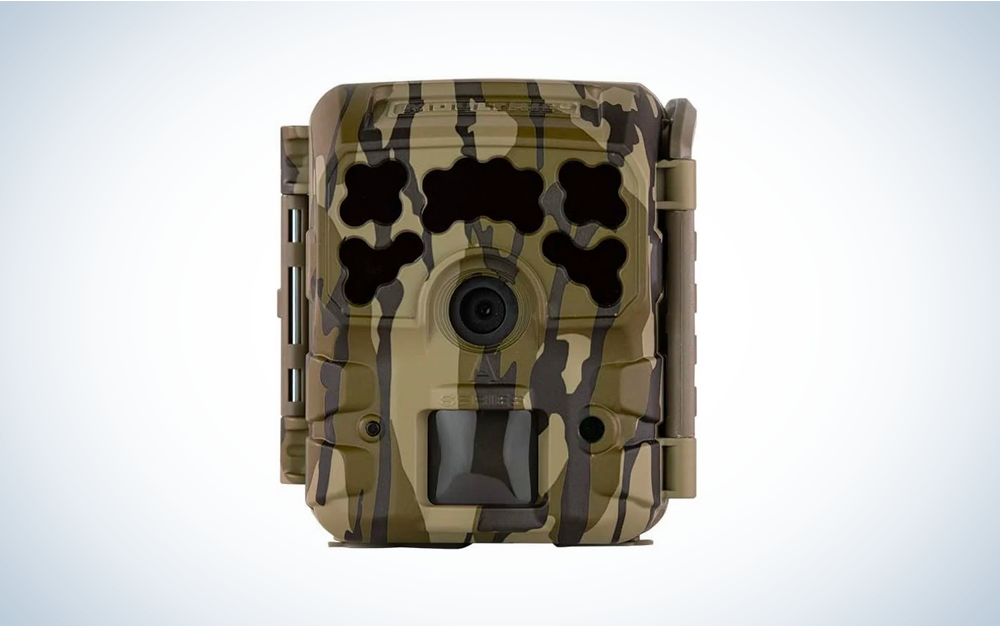
Why it made the cut: This is a fine camera at a very reasonable price, and its tiny physical imprint makes it the perfect candidate for spots where you’re worried about spooky deer (or paranoid trespassers).
Specs
Trigger speed: .04 seconds
Detection range: 70 feet
Power: Four AA batteries
Price: $89.99
Pros
Small physical size
Excellent price
Solid pics and video
Easy setup
Cons
Slower trigger speed
Ho-hum detection range
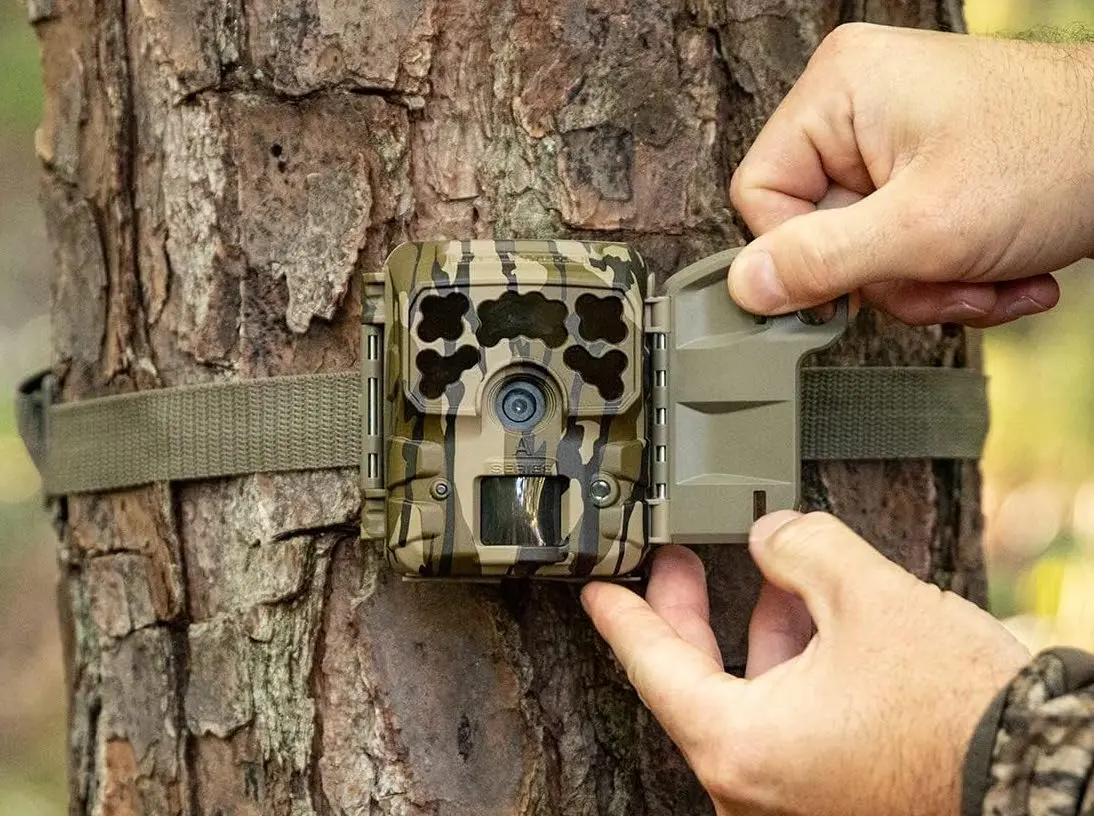
| The new Moultrie Micro-42i is one of the smallest full-featured trail cameras you can buy. Moultrie |
This camera literally fit in the palm of my hand, which makes it the perfect choice for hanging on a skinny sapling, or in a spot where you’re targeting a paranoid buck, or a setup where you’re trying to nab a trespasser or thief. It’s aslo just nice to have a cam that doesn’t take up much room in your pack. this mighty mite shoots perfectly fine pics and videos. You may not get the high-end performance of a Reconyx or Browning, but then again, you’re getting a perfectly fine and very handy unit for a fraction of the cost. In a further nod to economy, four AA batteries are included with the kit (did I mention batteries are expensive?), and I enjoyed the incredibly easy setup functions of this camera. In the end, if you’re looking for a bargain and like an extra-small camera, this is the one for you.
Best Newcomer: Alpha Cam Dual Lens 4K
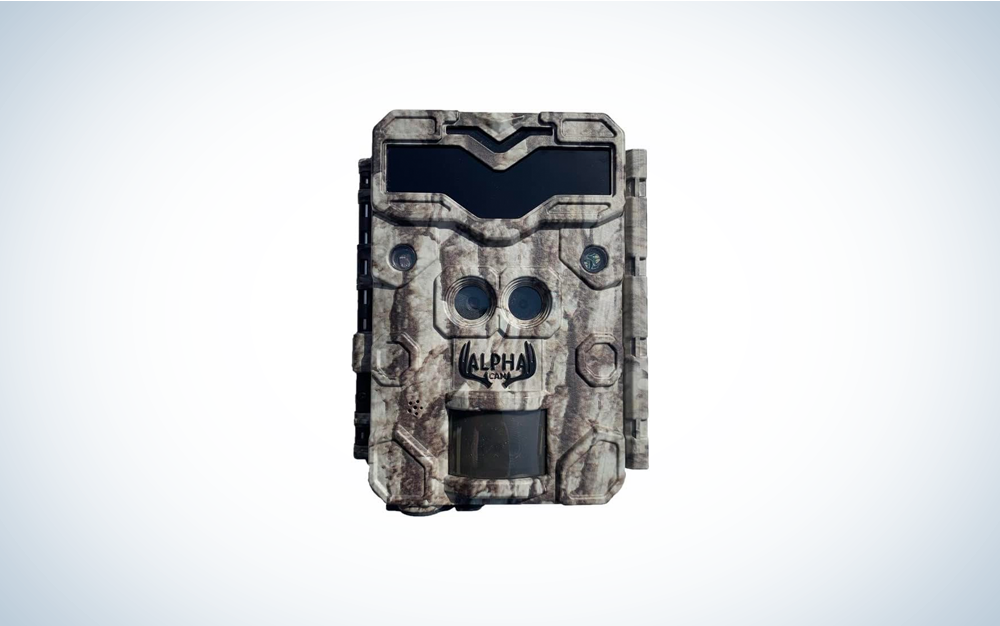
Why it made the cut: I’m always on the hunt for a great newcomer and word-of-mouth on the Alpha Cam was very good. This camera lived up to the hype.
Specs
Trigger speed: .2 seconds
Detection range: 80 feet
Power: 8 AA batteries
Price: $129.95
Pros
Super-quick trigger
Solid case design
Good nighttime pics
Easy programming
Cons
I found the SD card a little clumsy to get at
This has to be one of the most exciting new cameras on the market. The big viewing screen (over 2 inches) was crystal clear and made programming the camera a snap; I only read the instructions as a formality, as instructions on the screen basically led me through it. Picture quality was perfectly fine; it may be a half a step below the browning in this regard, but so is it’s price tag. The trigger on the Alpha, however, can compete with the very best on the market, and the detection range is solid too. I haven’t used the camera long enough to judge battery life, but if it’s solid, this will be one of the best conventional cams out there, and a solid value too.
Bushnell Prime Low Glow Trail Camera
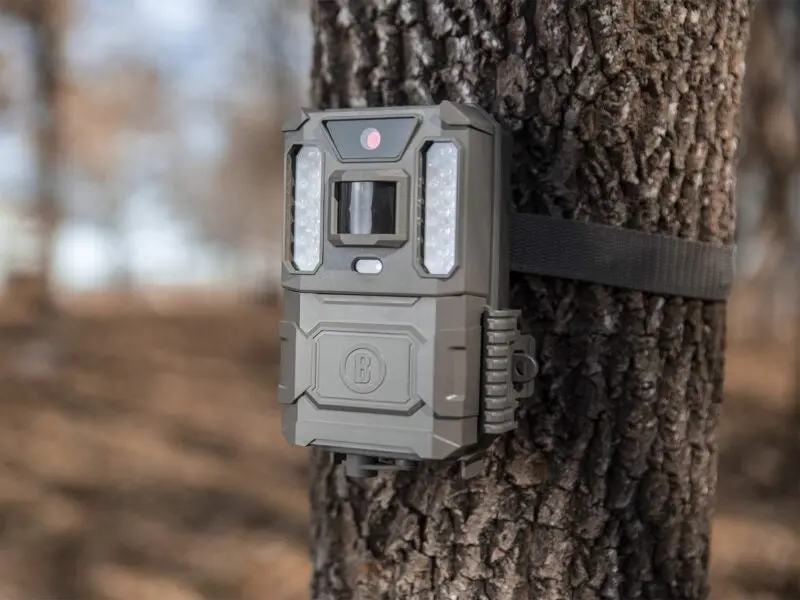
Specs
Trigger Speed: 0.3 seconds
Detection Range: 100 ft.
Power: 6 AA batteries
Price: Starts at $119.99
Pros
Fast recovery rate
Mid-range price point
Good detection range
Cons
Defective battery trays reported
Bushnell knows trail cameras, and it’s Prime Low Glow is a shining example of the emphasis this manufacturer places on quality. This SD-card camera takes 1080p video at 30 fps while recording audio. It has a .3-second trigger that can be manipulated in intervals ranging from one second to a full 60 minutes—making the camera perfect for feeder watch as well as snapping images at well-used trail junctions. The menu was designed to be easy to use, and 36 low-glow LEDs combined with 24 megapixels provide images full of color and detail, and the impressive 100-foot detection range means you’ll get plenty of pictures to look over. The Prime Low Glow has a two-year warranty.
Stealth Cam DS4K MAX Infrared Camera

Specs
Trigger Speed: 0.2 seconds
Detection Range: 100 ft.
Power: 12 AA batteries
Price: $129.99
Pros
Records 4K in daytime
Integrated Python lock latch
Burst mode included
Cons
Only 1-year warranty
Stealth Cam gave their popular DS4K MAX a facelift last year, and while not new for 2023, the updated version remains available and an excellent camera for the prick. Many of the features that hunters liked so much about the original, like 4K video and a 100-foot flash detection range, are back, but now users can enjoy the benefits of a 32-megapixel sensor. As I noted early, megapixel ratings don’t always mean much, but the quality of my test-camera images don’t lie—many of which showed enough detail not just to count tines but also the number of whiskers on a deer’s nose. The DS4K MAX is fitted with 42 No Glo IR flash emitters, and the technology-challenged crowd will appreciate the camera’s Quick-Set pre-programmed mode. Numerous custom modes are offered, and burst modes can be set to snap between one and nine images. This trail camera runs on 12 AA batteries, and it also has an external power jack for a 12-volt battery box.
Read Next: Best Cellular Trail Cameras of 2023
Why Trust Us
For more than 125 years, Field & Stream has been providing readers with honest and authentic coverage of outdoor gear. Our writers and editors eat, sleep, and breathe the outdoors, and that passion comes through in our product reviews. You can count on F&S to keep you up to date on the best new gear. And when we write about a product—whether it’s a bass lure or a backpack—we cover the good and the bad, so you know exactly what to expect before you decide to make a purchase.
![Field & Stream [dev]](https://images.ctfassets.net/fbkgl98xrr9f/1GnddAVcyeew2hQvUmrFpw/e4ca91baa53a1ecd66f76b1ef472932b/mob-logo.svg)





